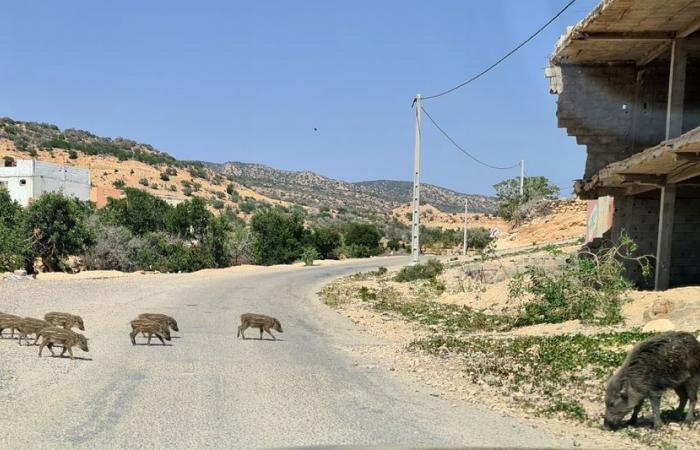The proliferation of wild boars in rural regions of Morocco seriously threatens agriculture in the Souss-Massa and Marrakech-Safi regions. Despite the efforts of the authorities, farmers remain powerless in the face of this scourge, limited by legal restrictions. Wild boars endanger subsistence agriculture and risk accelerating the rural exodus.
In many rural regions of Morocco, the proliferation of wild boars continues to cause great concern among residents. This persistent problem, which seriously affects local agriculture, highlights the challenges faced by small farmers and rural communities in their struggle to preserve their livelihoods.
Last summer was particularly difficult for corn farmers, demonstrating the alarming speed with which the wild boar population is multiplying. This situation highlights the inadequacy of the current measures put in place by the Ministry of Agriculture and Water and Forests to effectively contain this scourge. Farmers find themselves in a paradoxical situation: on the one hand, they suffer the damage caused by wild boars, and on the other, they are limited in their actions by legal restrictions which prohibit them from any direct intervention against these animals.
As the new agricultural season approaches, which coincides with the hunting period, representatives of local communities are renewing their calls for the organization of hunts in areas where the wild boar population has reached critical levels. These actions are considered essential to protect subsistence and solidarity agriculture, the economic pillar of local populations on the outskirts of urban areas.
It is important to note that efforts have already been undertaken by the authorities. During the 2021 and 2022 agricultural season, the ministry had planned around 1,600 hunts as part of its national wild boar regulation program. Traps had even been set up in certain areas where the searches had proved insufficient. However, given the scale of the problem, residents of the affected regions are urging the continuation and intensification of these initiatives in the coming months, in the hope of significantly reducing the damage caused by these animals.
However, the Souss-Massa region is particularly affected by this problem. Although the wild boar population has decreased compared to previous years, the problem persists and continues to hinder citizens’ agricultural investments on their land. Small farmers in the region find it impossible to engage in agricultural activities without having adequate means of protection, such as nets or fences to protect their fields. Wild boars, attracted to wetlands or agricultural areas, cause considerable devastation to the detriment of local populations.
Indeed, this phenomenon spares neither the plains nor the mountains. In the latter, the situation is all the more worrying as these animals, capable of reproducing up to twice a year, cause significant damage. Residents stress that if the searches are not carried out with sufficient frequency, they will not be able to stem this growing threat. They therefore call for strengthened collaboration between the Ministry of Agriculture, the Water and Forestry services, and the municipal councils to implement a more effective and coordinated strategy.
The situation is hardly more encouraging in the neighboring region of Marrakech-Safi. The problem, which has persisted for years, seriously threatens subsistence agriculture, discouraging residents from continuing to cultivate their land. Last summer, during the corn growing season, the region particularly suffered from the intrusion of wild boars, a phenomenon more marked in the mountains than in the plains. In these rural areas, where subsistence agriculture constitutes the main source of income for many households, neglect of this problem, especially in times of drought, could accelerate the rural exodus.
Although the hunts do not always cover the entirety of the affected areas, they currently remain the best option for containing the invasion of wild boars. Unfortunately, current legislation prevents residents from taking direct action to protect their crops. This situation highlights the need for a collaborative approach between authorities and local communities to develop and implement a sustainable solution.






